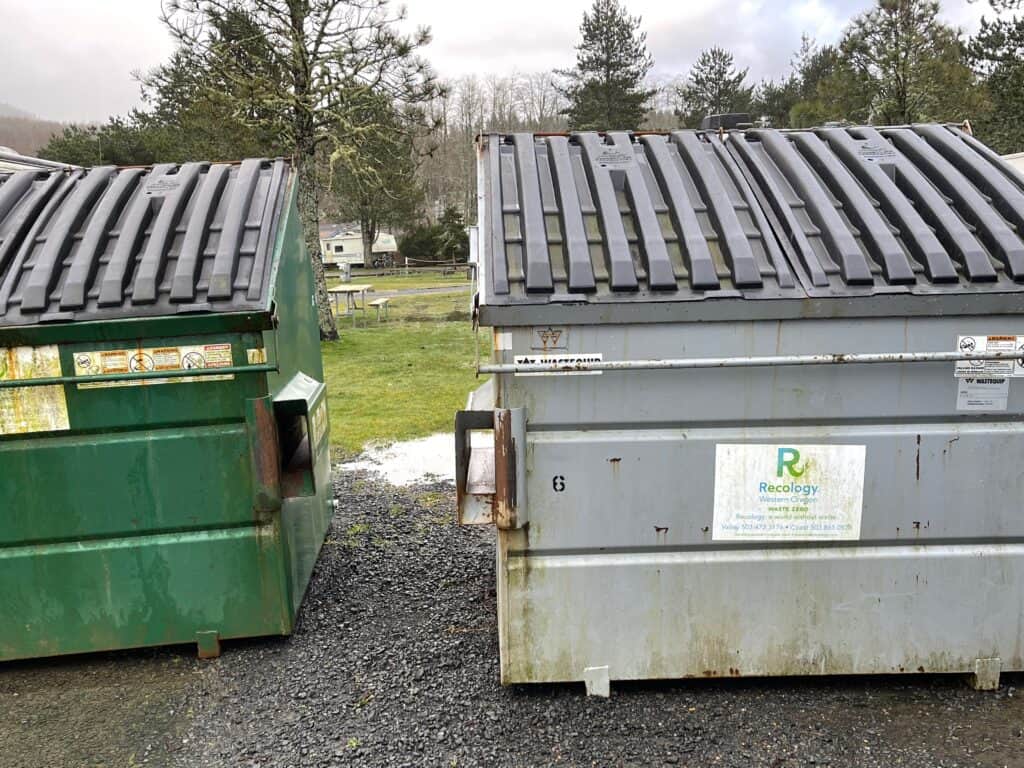
The Ins And Outs Of RV Recycling
Many campgrounds offer recycling services and allow you to put cans, plastic, paper, cardboard, and even glass in their recycling bins to keep it out of the trash.
That seems great on the surface and makes us feel like we’re doing our part to save the planet, but when you start to dig into the facts surrounding recycling, it makes you wonder if we’re doing enough.
Reduce, Reuse, Recycle
Maybe the better thing to do is look at what we typically recycle and what we throw in the trash and ask ourselves how much of that material can we eliminate altogether from our lives, or what can we directly recycle.
For example, can we redeem our bottles and cans directly for cash? It’s less about getting $.05 per container than it is about making sure that each used bottle and can is sorted and sent to the appropriate location where it will be reprocessed back into a useful product. Remember the most sustainable behavior is to reduce and reuse, with recycling as the least attractive option.
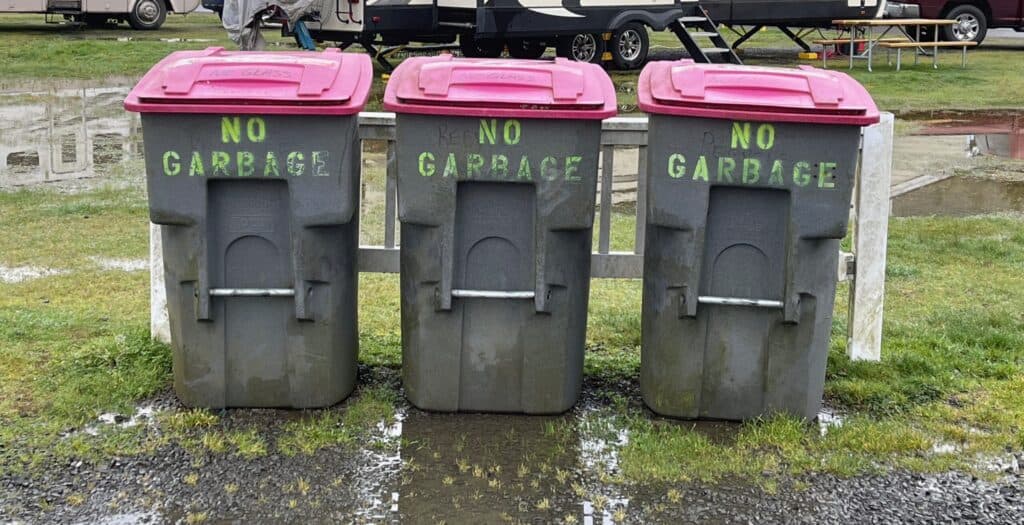
As you probably have observed, the dumpsters in most RV parks usually fill up and are often overflowing, especially during peak season, before the garbage collector can get back to the park to empty the bins.
Why is there so much trash generated by RVers? Are we thinking, “What the heck, we’re on vacation, our decisions don’t really matter?” Well, yes, they do!
Every decision, big and small has an impact on the waste and recycling problem, even when we’re in our RVs and staying in someone else’s campground. And our decisions are even more important when we’re boondocking.
The problem with recycling
The waste/recycling problem goes much deeper than what we see in our campgrounds and it’s worth taking a deeper dive into the in and outs of all recycling.
Since 2018, the US recycling systems have been upended. Have you ever given a second thought to the stuff you put in a recycling bin? You should, because in reality, much of it is too contaminated to be reused so it goes to a landfill, or gets dumped in the ocean, or is incinerated.
This is a significant problem because the landfills’ off-gas methane and carbon dioxide and much of the plastic in the landfill will not degrade in our lifetime or the lifetimes of the next several generations. Incineration creates toxic, noxious air pollution, and dumping the waste in the ocean is even worse than the other two options since it impacts a wide array of ecosystems and food chains.
Historically, western cultures just sold most of their recycled materials to China. Problem solved!
China’s growing manufacturing sector would reuse some of these materials, but much of it got dumped in the ocean off the coast of China, or it was incinerated there or became part of their landfills. Hundreds of tons of this material ended up right where it would have been in the US, but now we added the pollution and environmental damage of moving this tonnage clear across the planet.
We’re talking about hundreds of container ships, crossing the ocean just to dump our “recycled” waste into the China sea, or into their air or landfill. In my opinion that’s crazy on steroids.
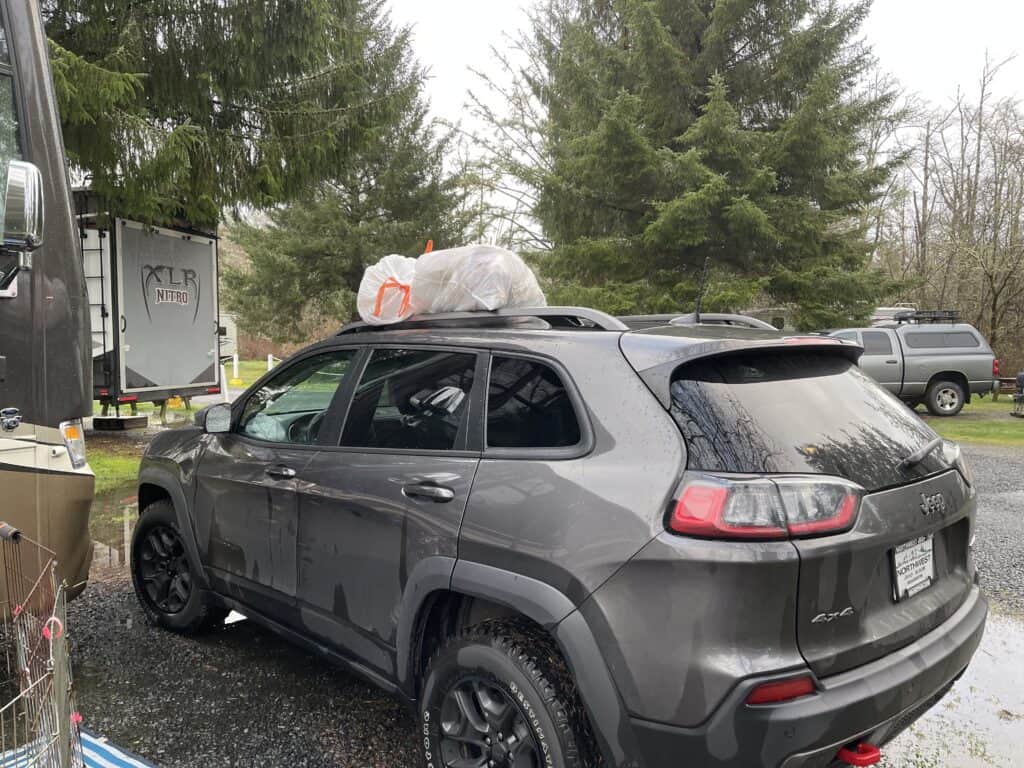
Where do recycled materials go?
In 2018, China banned the import of foreign recycled materials, like cardboard, glass, and plastic. The US quickly switched their exports to other countries like Thailand, Cambodia, Bangladesh, Ghana, Laos, Ethiopia, Kenya, Senega, and Vietnam, but those countries, like China, were quickly overwhelmed with our junk.
They also banned the import of foreign waste and that left the US in a precarious position since we had never developed a viable plan for processing our own recycled materials.
The state and local entities that regulate the garbage and recycling industry were caught unprepared when they were no longer able to export this waste. Historically, they had collected some revenue from the sale of the waste products, which was needed to offset the costs of collection and handling.
Government entities quickly learned that what had previous produced a small revenue stream was now straining their budgets. For example, before China’s import ban in 2018, Bakersfield CA earned $65 per ton for recycled materials.
After the ban, it cost the city $25 per ton to dispose of it. Their budget did not include money to dispose of recycled waste. No city or county was prepared to absorb these extra costs which could be substantial. In Stamford CT (a city of only 130,000 people) the annual cost to dispose of its recycling was $700,000.
After decades of promoting recycling and conditioning the citizenry to separate trash from recyclable materials, urban and rural garbage collectors were forced to terminate their recycling programs.
Unfortunately, they quickly learned that the citizens, who had been so slow and reluctant to get on board with recycling, were now enraged that garbage collectors had terminated recycling programs, and via widespread public protests, demanded that the recycling programs be reinstated. Consequently, local and regional governments were forced to add recycling costs to their already strained budgets, a no-win situation for most, if not all of them.
New recycling policies
Clearly, the US and other developed countries that had relied on making their recycling problem someone else’s problem, had to change and do so quickly. This necessitated many changes. First was a recognition that compostable materials make up a huge segment of all waste and that it is some of the easiest waste to recycle, with few negative environmental side effects.
Therefore, many cities now require all food handling enterprises to separate compostable material from all other waste and place that material in compost collection bins. Other changes have come in the control of air pollution emanating from waste-to-energy incinerators, and a reevaluation of the real cost of landfills.
As long as dumping waste in landfills is the cheapest option then meaningful change will be harder to implement, but most forward-thinking urban and state governments now see landfills as a “waste of waste”. Since China’s 2018 ban, there have been national recycling bills introduced in Congress and 37 states are currently considering over 250 bills to alter and improve waste management.
If we can land a spaceship on Mars and fly a drone over the Martial landscape, I dare say that we can develop meaningful and lasting recycling policies. We just need the will to do so.
Recycling while camping
But what can we, the camping community, do to aid in the solution? First, we need to make small sustainable decisions when it comes to our RV recycling.
The popular mantra, reduce, reuse, and recycle is a good way to help us make better decisions. For example, we need to remember to take our reusable bags to the grocery store so we don’t need the thin plastic bags that almost never get recycled.
Bottled water is another place where we might be able to make a change. Could we use a reusable glass container or traveling mug with tap water instead of bottled water? Most of our RVs come with water filtrations systems, so our tap water might be as pure as bottled water.
Currently, only 21% of plastic bottles are recycled into some other product which means the other 79% ends up in a landfill, in the ocean, or in an incinerator. Plastic can only be recycled a couple of times before the polymers break down, so even if it does get recycled this time it will still become waste in the near future. Glass, on the other hand, can be recycled indefinitely.
Another thing we can do as RVers is think about all the stuff we take with up on a camping trip that may end up in a dumpster. Are the portable shades that frequently get mangled by the wind really necessary? If you do have a portable tent that is damaged beyond repair, could you break it down enough to get it into a recycling bin (preferably back at our home)?
At least the metal will get melted down and reused rather than end up in a landfill. Also, if we bring a new barbecue that we need to assemble in the campground or new lounge chairs that come in boxes, can we break down those large boxes and put them in the recycling container? Or better yet, we could start our next campfire with them, or take them home with us and recycle the cardboard there so the big boxes are not jamming up the waste bins in the park.
These are small personal decisions, but collectively they add up. We can reduce the volume of trash and RV recycling if we think about what we really need to enjoy a camping trip, and try to implement our own personal reduce, reuse, and recycling policies. Waste in the US is a huge problem (about 270 million tons to be more precise) but we can conquer this!
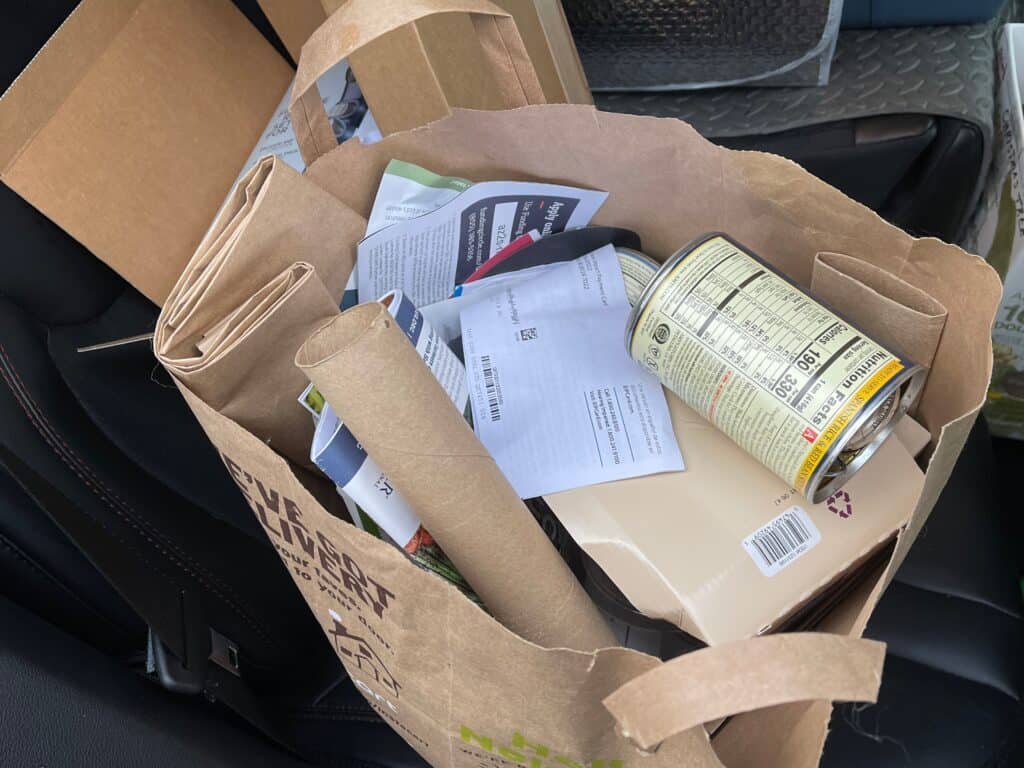
Get creative
Like I said before, if we can land on Mars, anything is possible. We just need the will to make it happen. We need the will to turn tons of solid waste into something useful every year. Like turning our plastic bottles into plastic decking material.
Think about it. We put water in one-use plastic bottles that won’t degrade for centuries, but we build our porches out of wooden boards that need to be treated every year to keep them from rotting. Let’s put the water in a container that will degrade and build our porches out of materials that will last for centuries. Reduce, reuse, recycle, and refocus. We’re RVers. Let’s lead the way.
Read more about RV recycling
Most of the specific facts for this article came from a Columbia education blog post. Read the full text here.
You can also learn more about finding RV recycling options in this post from Do It Yourself RV.
See also: 5 Myths About RV Composting Toilets

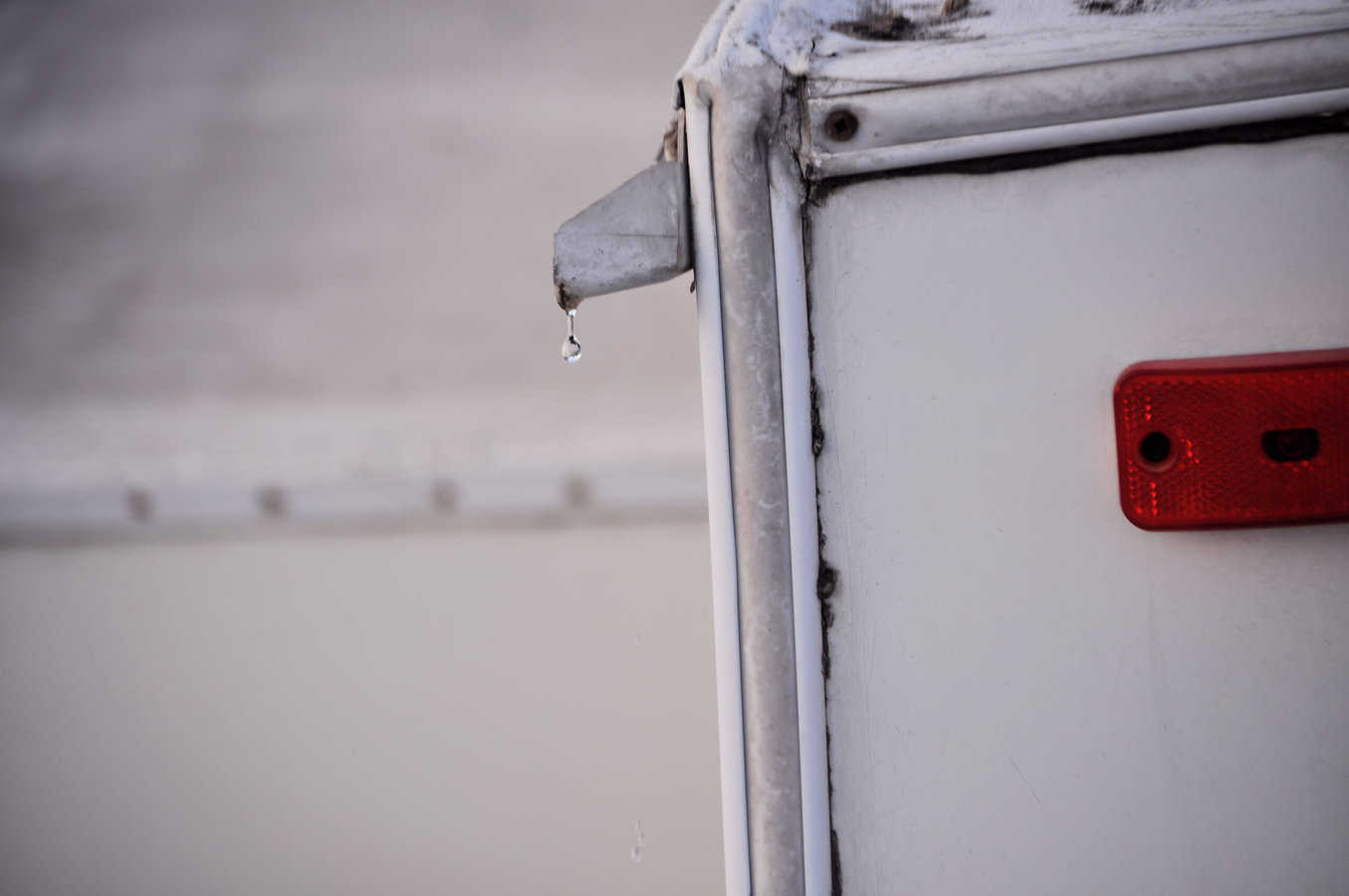
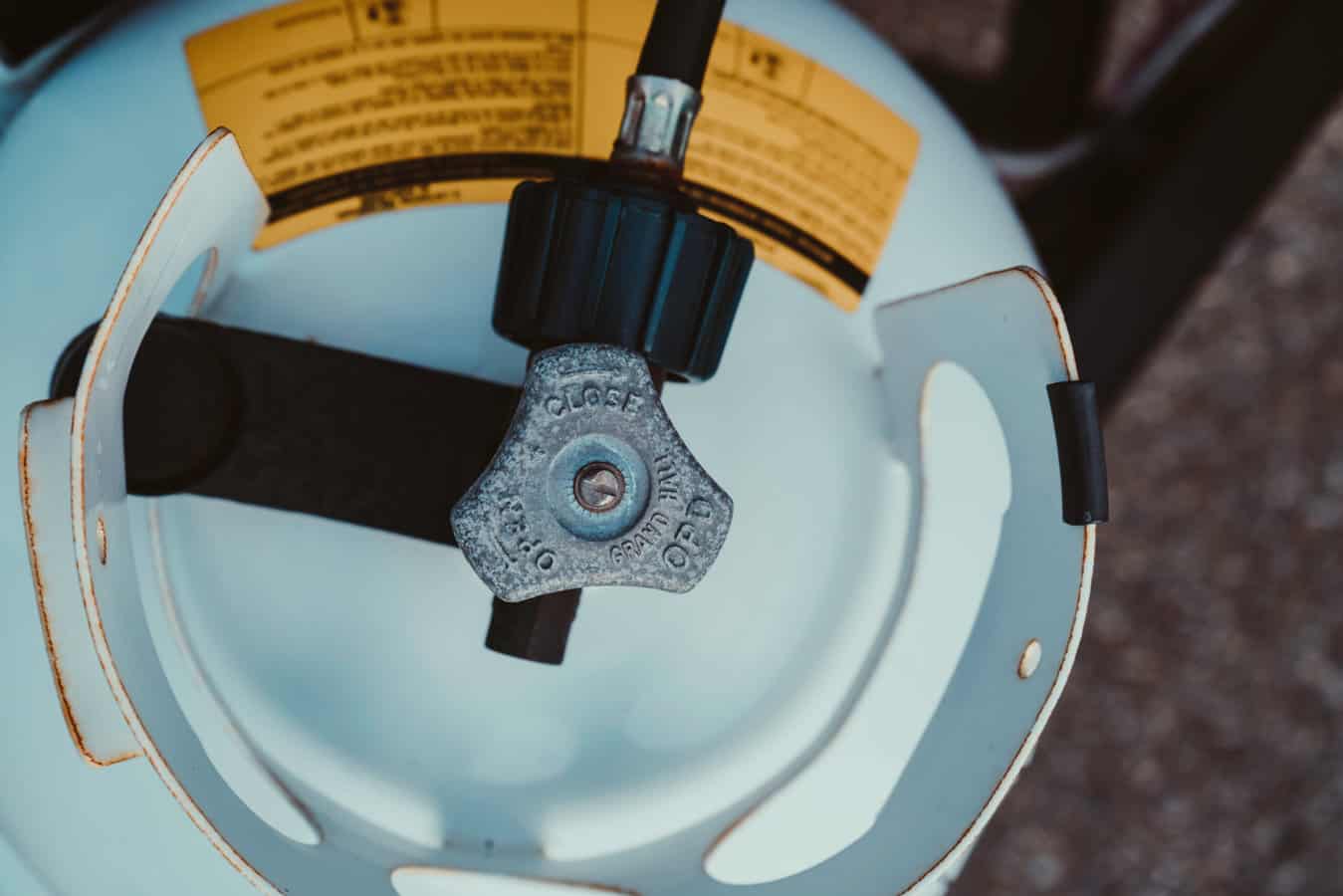

Thank you for a well researched article. We can always find better ways to take care of our world and each other.
I saw nothing mentioned of accessibility to recycling containers. I’d be much happier to participate if it was more convenient to dispose of recyclable things. I don’t have room in my rv to place more containers for those things. Frequently the camp grounds place their containers away from trash disposal areas- making it difficult for people to use them (if they have them at all). Also, many don’t supply as many recycle containers as they do for trash….or they are placed hundreds of feet away. I’m physically challenged so this is a big problem for me. I think if people would pay more attention and make some needed changes, we’d see more participation.
Excellent article thank you so much for pointing out this huge problem
I find that most camp grounds do not recycle. I ask at check in and most campgrounds state that they do not recycle.
Unfortunately while out walking the dog I saw one Florida campground crew dump the recycle bin in the trash. I think they did take out the AL first probably to cash it in them selves
An excellent article, this calls on all of us to use our intelligence in recycling. As dedicated as Mary and I have been to recycling, this spurs me on to more serious advance decision making. Now, if we could only get RV Resorts on board.
Glad to see these messages getting out there. Thank you
When RVing and eating out remember to take a container to take home leftovers. When shopping done prepackaged fresh fruit and vegetables.
More important than recycling is reducing consumption. Do you really need all the bottles of sugar water and alcohol, for example.
I think the biggest problem with recycling is that most people do not separate recyclables from the regular trash and put everything in the recycle bins. Hard to say if it’s on purpose or they don’t know the difference or just don’t care.
We have a recycle program in our community and I a lot of the containers with stuffed with the correct material along with trash.
One neighbor has never used the recycle containers, so I assume he just puts it in the regular trash, doesn’t care!
Great article. Thank you!
The park should manage for routine and seasonal camper load so dumpsters should NOT become overfilled, but people abuse the system and things will happen.
One reason garbage fills up is that we use paper plates camping (to conserve water), and disposable utensils. Some (even disposable) utensils can be washed safely. Conserve water by filling a jar with soapy water and soaking them til you have 10 or 20 to do as a batch. We can also help by STACKING paper plates when we put them in the garbage bag on the way to the dumpster.
Yes, we use plastic bottles and/or bottled water camping. We can limit waste by buying the 1 gal or 2.5 gal bottles for coffee, cooking, or to use with a thermos cup and ice. If you use individual bottles, get the rippled ones that you can ‘crush’. Loosen cap, twist and compress, and re-tighten cap; the vacuum will keep it crushed. Similarly with cans. With a little twist, empty aluminum cans are fairly easy to crush. Wear gloves if worried about sharp points at folds. If you can’t do that, then DO get a can crusher and mount it somewhere that it is useful. Or place can on ground and mash with foot.
A little common sense, a little courtesy, and maybe even a little sacrifice of convenience can add up to a big difference. Hope to see you camping and hoping I’m as courteous as my neighbor.
“Treat your neighbors better, and you’ll have better neighbors.” -Ernest Tubb
A great topic and one that all people will ultimately have to deal with at some point in the future. The world, our only world, is being buried in trash and plastics!
The thing I’ve noticed while traveling is how many places that could be recycling aren’t, with no place but the trash containers for everything to go into.
I know some bigger cities are rumored to separate the recycle from the trash at their collection sites. But we’ve stayed at so many RV parks with and so many more without dedicated recycling bins.
It makes it tough if you like and want to recycle as I do when we’re home.
I have been taking all my stuff back home for recycling or disposal when out camping in my RV . Pack out what you pack in , from my backpacking days . Also I try to leave my campsite a bit nicer that how it was when I got there.
Thank you for writing this Peggy! I have been thinking about this a lot lately. My partner and I started sorting out compostables and since we live in a city that composts we bring it home with us. We sort our recycling out as well. We also don’t use throw away cutlery, plates, cups, etc. We use Corelle which is indestructible and we just bought glasses from Greens Steal, they are the old school aluminum ones but at a very reasonable price.
We can all do more and we can always do better, thanks again for writing about this.